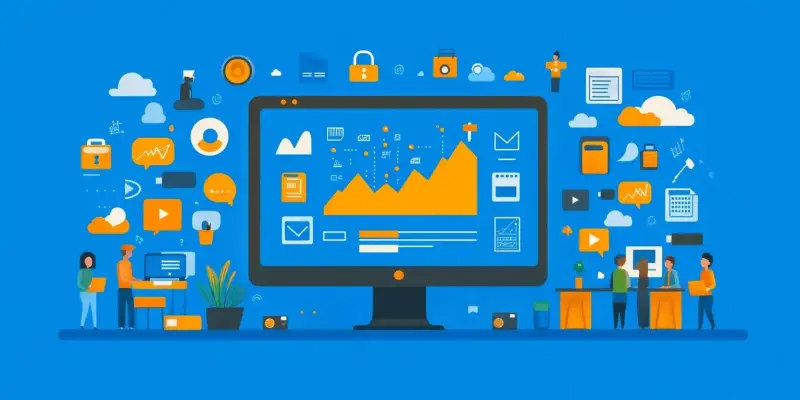In an ever-evolving digital marketplace, B2B marketers are facing a critical juncture, with 2025 emerging as the pivotal year wherein the adoption of personalized marketing strategies becomes not just advantageous but essential for survival. The upcoming years predict a substantial shift in the marketing landscape, wherein traditional, one-size-fits-all approaches cease to meet the expectations of sophisticated, tech-fluent millennial and Gen-Z decision-makers. A new era of personalized, cohesive buyer experiences is on the horizon, compelling marketers to recalibrate their strategies to respond to these changing dynamics.
The Importance of Data and Technology in Personalization
Leveraging Customer Behavioral Data
To effectively engage a new generation of decision-makers, marketers must harness the power of data to craft personalized experiences. Utilizing customer behavioral data, including purchase history and engagement patterns, has become central to this endeavor. The ability to analyze and interpret this data allows marketers to predict needs and tailor communications that resonate on a deeper, more personal level. These tailored interactions are what the modern buyer craves, with a significant percentage of B2B buyers expressing frustration when their expectations for personalization are not met.
As B2B buyers increasingly expect personalized interactions, the repercussions of failing to meet these demands become more pronounced. Without proper data utilization, marketers risk delivering irrelevant content, thereby diminishing trust and losing the engagement of potential buyers. A seamless and personalized experience must be provided at every touchpoint, necessitating a collaborative effort across departments such as sales, content, paid media, and email marketing. By involving all relevant departments early in the process, companies can ensure a cohesive strategy that enhances buyer satisfaction and loyalty.
Investment in Data Collection and Analysis
Solid data collection and analysis techniques are crucial for marketers aiming to stay competitive in 2025. Despite potential budget constraints, investing in advanced data analytics and technology solutions will drive personalized marketing efforts. Companies need to allocate resources wisely, prioritizing tools that offer deep insights into buyer behavior and preferences. By doing so, they can create more effective marketing campaigns that resonate with target audiences and drive higher conversion rates.
Moreover, the increasing reliance on artificial intelligence (AI) tools will play a significant role in enhancing data-driven personalization efforts. AI can analyze vast amounts of data quickly and generate actionable insights, allowing marketers to make informed decisions regarding content, timing, and channels of communication. As a result, the integration of AI into marketing strategies will become more prevalent, driving the shift towards hyper-personalized buyer experiences. The substantial investment in AI tools demonstrates the industry’s commitment to leveraging technology for better customer engagement.
Cross-Team Collaboration for Seamless Experiences
The Role of Departmental Collaboration
For personalized marketing to be truly effective, collaboration across various departments is essential. This collaborative approach ensures a consistent and cohesive buyer journey, from the initial touchpoint to the final purchase decision. Sales teams provide valuable insights into customer pain points, while content creators develop relevant materials that address these needs. Meanwhile, paid media and email marketers ensure that these messages reach the right audience at the right time. By working together, these departments can create a unified strategy that enhances the overall buyer experience.
Engaging buying committee members early in the process is also crucial to building strong relationships and understanding their unique needs. By collaborating with other departments, marketers can gather diverse perspectives and develop comprehensive strategies that address the concerns of all stakeholders. This inclusive approach fosters trust and credibility, ultimately leading to more successful marketing campaigns and higher conversion rates. The data-driven insights obtained from collaboration further enable marketers to refine their tactics and continuously improve the buyer experience.
The Shift Towards Personalized Buyer Journeys
The move towards personalization in B2B marketing is not just a trend but a necessity driven by evolving buyer expectations. Millennials and Gen-Z, who now hold significant decision-making power, demand tailored content and communications that address their specific needs and preferences. This shift requires marketers to move away from generic messaging and embrace a more targeted approach. By doing so, they can create meaningful connections with buyers, foster loyalty, and drive long-term business growth.
The Harris Poll data indicates that nearly half of marketing decision-makers are planning to allocate more resources towards personalization in the coming years. This investment highlights the industry’s recognition of the importance of personalized buyer journeys. Marketers who fail to adapt to this new paradigm risk becoming obsolete, as buyers increasingly gravitate towards brands that offer tailored experiences. To remain competitive, B2B marketers must prioritize personalization and continuously refine their strategies based on data-driven insights and cross-departmental collaboration.
Conclusion and Future Outlook
In a rapidly changing digital marketplace, B2B marketers are arriving at a crucial turning point. By 2025, the adoption of personalized marketing strategies will not only be beneficial but essential for remaining competitive. Forecasts for the next few years indicate a major transformation in the marketing landscape. Traditional, one-size-fits-all methods will no longer satisfy the expectations of sophisticated, tech-savvy millennial and Gen-Z decision-makers. A new era of personalized and cohesive buyer experiences is approaching, requiring marketers to adjust their strategies accordingly. This new approach will enable them to create more effective and meaningful connections with their audiences. As technology continues to advance, it will be imperative for marketers to leverage data-driven insights and tools to craft customized experiences that resonate with individual prospects and clients. Embracing this personalized marketing approach will be key to surviving and thriving in the competitive B2B landscape of the future.

